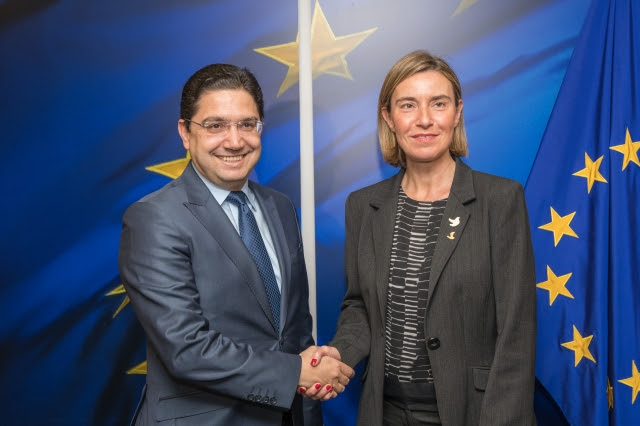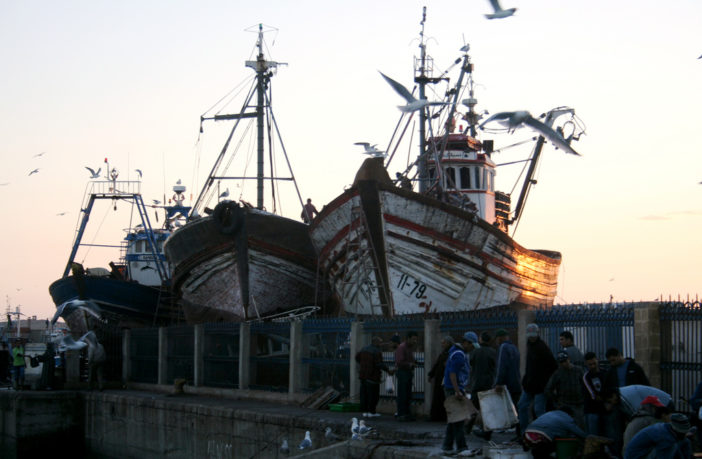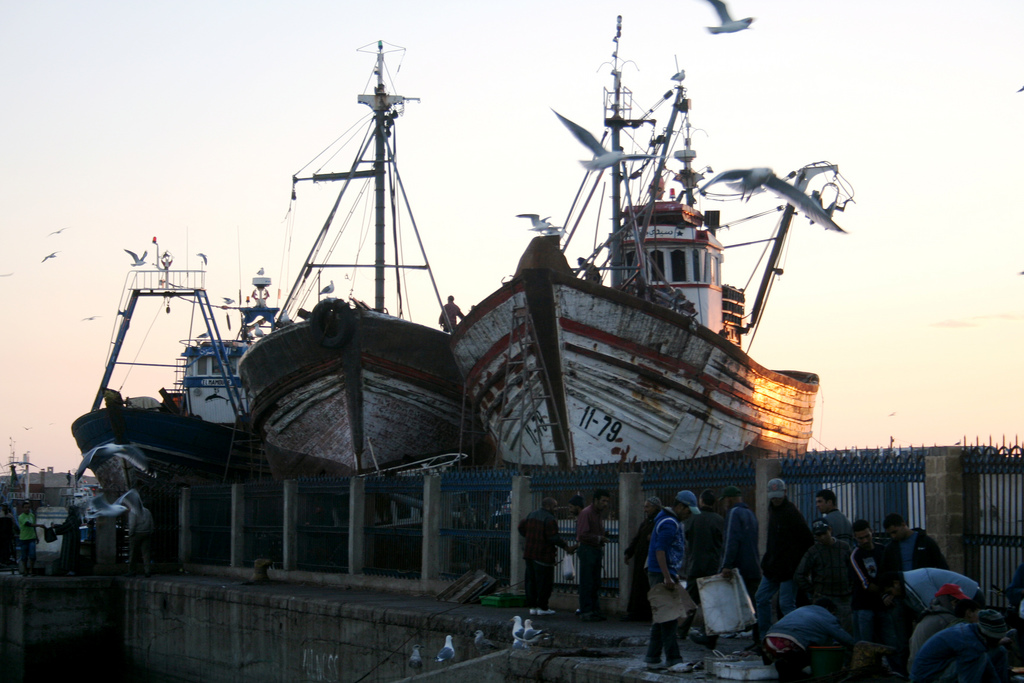Yabladi English
Fishing boats by the shore in Morocco./Ph. DR
Morocco and the European Union will resume next week negotiations initiated in April to renew the latest fisheries agreement.
During the first round, each party has submitted its amendments, asking questions related to the 2014 agreement to expire on the 14th of July. The decision came into force after the Court of Justice and European Union issued a ruling excluding the Western Sahara territorial waters from the agreement.
The High Representative of the Union for Foreign Affairs and Security Policy, Federica Mogherini and Minister of Foreign Affairs and International Cooperation, Nasser Bourita stated that they «have taken note of the judgment delivered by the Court of Justice and of the European Union on the fisheries agreement concluded between Morocco and the European Union».
 Foreign Minister Nasser Bourita and Federica Mogherini High Representative of the Union for Foreign Affairs and Security Policy./Ph. DR
Foreign Minister Nasser Bourita and Federica Mogherini High Representative of the Union for Foreign Affairs and Security Policy./Ph. DR
«The process of renewing the current fisheries agreement between Morocco and the European Union has been subjected to disruption», said political scientist Abdessamad Belkbir to Yabiladi. Commenting on the renewal of the treaty, he stressed that the regional organization has always been ready to cooperate with Morocco.
Meanwhile, political analyst Abdelfattah Fatihi, who believes that the Western Sahara conflict has affected the pace of the treaties concluded with the EU, argued that the fisheries agreement must be maintained.
«Sahrawis should benefit from the area’s natural resources and it is stupid to suspend the agreement just because the conflict has not been solved yet».
Throughout the years, Moroccan territorial waters have been one of the most primordial fishing destinations for Europe and the European Union. The urgent wish of concluding a fisheries treaty with the North African coastal Kingdom was initiated by Spain years before the creation of the continental body.
Spain and the first fisheries agreement with Morocco
Starting from the 1960s, and with the attempt to expand its fishing industry, Spanish vessels began operating in the Moroccan territorial waters. The trend paved the way for one of the first fisheries agreements between Morocco and a European country in 1977.
The fisheries treaty signed by Rabat and Madrid in 1977 «provided for the creation of joint ventures between Spanish and Moroccan fishermen, but it never entered into force», wrote International law professor Enrico Milano in his study entitled «The new Fisheries Partnership Agreement between the European Community and the Kingdom of Morocco: fishing too south?».
The agreement, unfortunately, never entered into force «due to the lack of ratification by the Moroccan parliament», argued Milano.
A second agreement saw the light of day in 1983. The latter entered into force, covering the areas north of Cape Noun and the Mediterranean and south of Cape Noun, in southern Morocco. At the time, Spain insisted that the treaty was not recognition of Morocco’s sovereignty over Western Sahara, explained Milano in the same study.
Spain’s interest in sending its vessels to the Moroccan waters remained prominent even when Madrid and Lisbon joined the European Economic Community, created in 1957 through the treaty of Rome.
The European Economic Community and the rise of a new fisheries treaty
Under the auspices of the economic regional organization, Spain was part of the 1988 fisheries agreement concluded with the Kingdom. The treaty allowed Spain and Portugal to receive 800 annual licenses for their trawlers to fish for 4 years in the Moroccan waters. In exchange, Rabat was granted 282 million Euros to boost its fisheries sector.
The European contribution grew bigger with the 1992 agreement set to last for another four years. The commission gave Morocco 310 million Euros and was ready to respect the biological rest periods. The treaty was terminated earlier than expected.
«The European Commission and Morocco agreed on 13 October 1994 to end their four-year agreement a year early on 30 April 1995», as documented by the Netherlands Institute for Law of the Sea. The decision was taken after the two parties failed to discuss the renewal of the agreement.
The 1999 agreement and El Youssoufi’s firm decision
The European Union and the Kingdom of Morocco resumed negotiations on the 28 of August 1995 to renew the 1992 agreement. The talks successfully granted EU vessels the right to operate in areas «under the national jurisdiction».
After it expired in 1999, the Moroccan government refused to renew the 1995 agreement due to the decision of Prime Minister Abderahman El Youssoufi. On the 4th of November 1999, 430 EU trawlers were prohibited from operating in the Moroccan territorial waters.
«All vessels operating under this fisheries agreement will have to leave the Kingdom’s territorial waters Wednesday before midnight», wrote the Foreign Ministry in a communiqué issued at the time.
El Youssoufi announced later in a conference that the next fisheries agreement must take into consideration ways to boost, develop and promote the Moroccan fisheries sector. For more than 7 years there was no fisheries agreement with Morocco and the European Union.
Former Moroccan Prime Minister Abderahmane El Youssoufi and José Maria Anzar on the 27th of April in 1998./Ph. Abdelhak Senna-AFP
In July 2005, things changed with the initiation of the Fisheries Partnership Agreement (FPA). Entered into force on the 28 of February 2007, Morocco allowed 11 ships from EU member states to fish in its waters.
«As compensation, the European Union provides an annual payment of 36 million Euros», wrote Gary Clyde Hufbauer and Claire Brunel in a study that suggests ways for Morocco to take better advantage of its cooperation agreements with the EU.
A third of the above-mentioned compensation was for the development of sustainable fishing activities in Morocco and the modernization of the country’s coastal fleet.
The agreement run until the 27th of February, 2011 and was renewed for one year until it expired in 2012. A second fisheries agreement between Morocco and the European Union entered into force in 2014 for four years.
The latter gave EU vessels access to the Atlantic fishing zones for a financial contribution for 30 million Euros.
The same agreement is still making headlines as the European Union and Spain, in particular, are not ready to stop a partnership they have maintained since the 60s.









